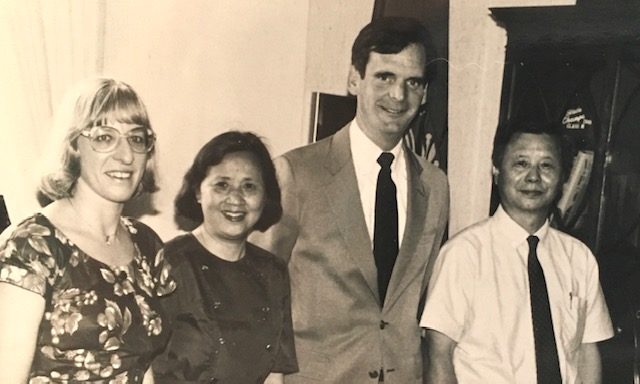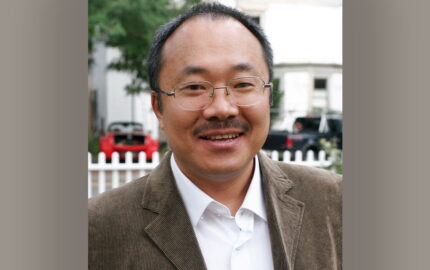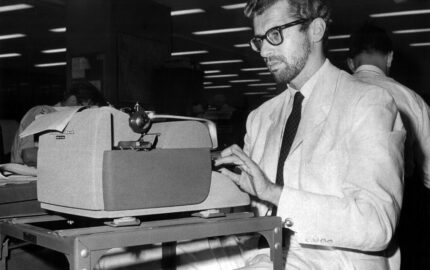History was often unkind to Hsiao Ching-chang of the Nieman class of 1985, but his intelligence, patience and good nature bore him through his travails. Mr. Hsiao, as he was known to the class, died last week at the age of 95 after a struggle with dementia. Yang Meirong, his wife, cared for him during his illness and survives him.
The two had come to Harvard together. Both had been reporters for three decades, he for the Wenhui Daily, she for the Liberation Daily. They were popular with the class, social, inquisitive.
I applied for a Nieman in part because as the new editor at the Concord Monitor after years as a local journalist, I wanted to learn more about other countries to help me lead the paper’s foreign coverage. I audited classes in Latin American history, Russian history and modern China and learned about apartheid firsthand from Zwelakhe Sisulu, our South African classmate.
Inadvertently, Ching-chang and Meirong taught me a lesson about their country. After Rod MacFarquhar, the professor in my China course, announced that a former Red Guard would speak at the next session, I invited Ching-chang and Meirong to class with me. Moments after we arrived, MacFarquhar came over to tell me that the Red Guard had spotted them entering the classroom and now refused to speak. Though I was embarrassed, the incident gave me a sense of the long arm of paranoia in Chinese culture.
Not long afterward, I drove Ching-chang and Meirong north for a New Hampshire town meeting. They asked good questions as I explained the ways and customs of this ultimate example of American participatory democracy.
Shortly after they returned to China, journalism groups in Shanghai and Beijing invited our classmate Ed Chen, then of the Los Angeles Times, to visit the country. Ed speaks Mandarin. Many years earlier, his grandfather had headed the Central News Agency, China’s then-equivalent of The Associated Press. As Ching-chang and Meirong escorted Ed from city to city, he sensed the high regard in which their colleagues held them.
The language barrier kept my wife Monique and me from learning as much as we’d have liked about Ching-chang and Meirong’s life in China, but I think they had suffered during the political upheavals there.
In 1990, a year after the Tiananmen Square massacre, most of our class reunited at the 50th anniversary party for the Nieman program. Ching-chang and Meirong visited us afterward in Concord, where I showed them around the Monitor and Monique escorted them on a tour of the Statehouse. The three of them had their picture taken with then-Gov. Judd Gregg.
Ching-chang and Meirong learned during this trip to the U.S. that conditions in China would make it perilous for them to return. This permanently upended their lives. They stayed with relatives in Cambridge for a while before the China Times Center for Media and Social Studies at the University of Minnesota’s School of Journalism and Mass Communication took them on as scholars. They lived in Minneapolis for many years.
Monique and I stayed in touch mainly through holiday letters with Meirong. Then, in 2014, we took a vacation to San Diego, their home in retirement. They decided to be our hosts throughout the week, picking us up at our B&B to take us to see the sights. The first afternoon, they drove us to the best Chinese restaurant in the city for lunch. Twice, Meirong cooked multicourse dinners for us in their small apartment. For daytime adventures, they showed us Balboa Park, the splendor of the Hotel del Coronado and the majestic views from Point Loma.
Our fondest memory of the visit was their friendship and their company, especially during our unforgettable drives about the city. Our relationship with Ching-chang and Meirong proved to be a great, lasting and unexpected gift of our Nieman year. We will miss the quiet, charming Mr. Hsiao and stay in closer touch with Meirong now that he is gone.
The two had come to Harvard together. Both had been reporters for three decades, he for the Wenhui Daily, she for the Liberation Daily. They were popular with the class, social, inquisitive.
I applied for a Nieman in part because as the new editor at the Concord Monitor after years as a local journalist, I wanted to learn more about other countries to help me lead the paper’s foreign coverage. I audited classes in Latin American history, Russian history and modern China and learned about apartheid firsthand from Zwelakhe Sisulu, our South African classmate.
Inadvertently, Ching-chang and Meirong taught me a lesson about their country. After Rod MacFarquhar, the professor in my China course, announced that a former Red Guard would speak at the next session, I invited Ching-chang and Meirong to class with me. Moments after we arrived, MacFarquhar came over to tell me that the Red Guard had spotted them entering the classroom and now refused to speak. Though I was embarrassed, the incident gave me a sense of the long arm of paranoia in Chinese culture.
Not long afterward, I drove Ching-chang and Meirong north for a New Hampshire town meeting. They asked good questions as I explained the ways and customs of this ultimate example of American participatory democracy.
Shortly after they returned to China, journalism groups in Shanghai and Beijing invited our classmate Ed Chen, then of the Los Angeles Times, to visit the country. Ed speaks Mandarin. Many years earlier, his grandfather had headed the Central News Agency, China’s then-equivalent of The Associated Press. As Ching-chang and Meirong escorted Ed from city to city, he sensed the high regard in which their colleagues held them.
The language barrier kept my wife Monique and me from learning as much as we’d have liked about Ching-chang and Meirong’s life in China, but I think they had suffered during the political upheavals there.
In 1990, a year after the Tiananmen Square massacre, most of our class reunited at the 50th anniversary party for the Nieman program. Ching-chang and Meirong visited us afterward in Concord, where I showed them around the Monitor and Monique escorted them on a tour of the Statehouse. The three of them had their picture taken with then-Gov. Judd Gregg.
Ching-chang and Meirong learned during this trip to the U.S. that conditions in China would make it perilous for them to return. This permanently upended their lives. They stayed with relatives in Cambridge for a while before the China Times Center for Media and Social Studies at the University of Minnesota’s School of Journalism and Mass Communication took them on as scholars. They lived in Minneapolis for many years.
Monique and I stayed in touch mainly through holiday letters with Meirong. Then, in 2014, we took a vacation to San Diego, their home in retirement. They decided to be our hosts throughout the week, picking us up at our B&B to take us to see the sights. The first afternoon, they drove us to the best Chinese restaurant in the city for lunch. Twice, Meirong cooked multicourse dinners for us in their small apartment. For daytime adventures, they showed us Balboa Park, the splendor of the Hotel del Coronado and the majestic views from Point Loma.
Our fondest memory of the visit was their friendship and their company, especially during our unforgettable drives about the city. Our relationship with Ching-chang and Meirong proved to be a great, lasting and unexpected gift of our Nieman year. We will miss the quiet, charming Mr. Hsiao and stay in closer touch with Meirong now that he is gone.



